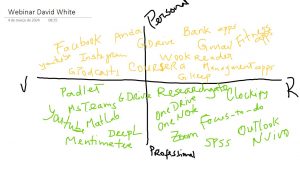Being aware that the way we think is rooted in our life experiences and education is very important in breaking the rigidity of thinking and being open to listening and integrating other perspectives. Then, knowledge can happen. One of my personal development goals is to try to identify and understand why people see the same issue from different perspectives and to put myself in their shoes. I believe that achieving this understanding will make me able to accept more of other people’s perspectives and make me a wise person (one day…).
I am part of a research community of practice. I think it is similar to the communities of practice discussed by Wenger (2010).
We are a group of Masters and PhD students and junior researchers. There is also a senior researcher who is a teacher and the supervisor of most of the students. We learn by presenting, commenting on and discussing each other’s work. The supervisor also comments on the work, but she’s also subject to the comments on the students’ presentations. There is no criticism, only discussion of research options and suggestions for improvement. When I presented this experience to my PBL group, a colleague raised the question of power issues that might be present in such a community, given the involvement of a senior researcher. I never felt it, but I cannot deny that there could be power imbalances in my research community of practice, especially for Masters students.
Participating in my research community of practice, as well as (and especially) in my PBL group, is very challenging as I can’t always follow the line of thought of the other participants. But participating in such groups is also very enriching because I can connect with other ways of thinking that are grounded in people’s personal and professional life experiences. And that is certainly a step towards one of my life’s goals.
Just a note: my research community of practice is called JEDI (https://ciie.fpce.up.pt/en/copin/copin-z) 🙂
Wenger, E. (2010). Communities of practice and social learning systems: the career of a concept. In Social learning systems and communities of practice (pp. 179-198). Springer London.
